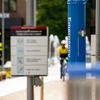Public Safety Audit
CONTENT
Summary and Charge
Recommendations and Action Steps
Progress on Key Recommendations
SUMMARY AND CHARGE
Temple University initiated an external, independent review of Campus Safety Services and the Temple University Police Department, focusing on its internal practices and procedures as well as its interactions with community members. 21CP Solutions was engaged to assess campus safety, policing, and community well-being through a wide-ranging review.
21CP began its work in earnest at Temple University in May 2022 when CSS was under the direction of then-Executive Director Charles Leone. The timing of 21CP’s work corresponded relatively closely with the onboarding of current Vice President of Public Safety, Dr. Jennifer Griffin. Consequently, the findings and state of operations that 21CP describes, in many instances, pre-date Dr. Griffin’s arrival and her initial efforts to make various changes to TUPD’s operations and public safety at Temple overall [see Public Safety Updates from January 2023 & March 2023.
The Public Safety Audit addresses TUPD and Public Safety as critical actors in the public safety infrastructure and ecosystem at Temple – but considers them as one of many University and Philadelphia resources that help to advance safety. As numerous aspects of 21CP’s review revealed and underscored, campus safety and the safety of the Philadelphia neighborhoods adjoining Temple are inextricably linked.
Even as faculty, staff, and students say they feel safe within the physical boundaries of the University’s campuses, fear and anxiety about off-campus safety impacts the campus community’s overall sense of well-being. This review was both necessary and timely, and one of several actions that Temple University will undertake to help protect its students, staff, faculty, and North Philadelphia community members.
Methodology & Approach
During its engagement, 21CP reviewed a substantial array of written materials, including TUPD policies and procedures; considered data on public safety generally and TUPD’s operations specifically; and engaged with an array of campus stakeholders and community members from the North Philadelphia neighborhoods adjacent to Temple. The review included in-depth reviews and analysis of:
- Crime, violence, and physical safety
- TUPD critical actions
- TUPD organization, administration, and officer support
- TUPD engagement and coordination with outside entities
Many have shared important perspectives on Temple's role within the community. For North Philadelphia’s communities to be safe, Temple needs to help convene and organize a diversity of City and community stakeholders to focus on preventing crime and transforming the root causes of violence – without over-policing communities that have too often bore the burden of unfair, unjust, and inequitable policing practices.
Following a thorough and extensive audit, 21CP crafted a series of recommendations grounded in best practices, emerging and promising public safety approaches, and an understanding of critical campus and community dynamics.
The safety and crime dynamics in which Temple operates are shaped by decades and generations of complex and interrelated factors. As Temple’s Violence Reduction Task Force observed in its October 2022 report, “there is a connection between crime and social and economic inequality and other effects of racism.”
21CP’s most general, but most critical recommendation, is that Temple must, modestly but with unflinching resolve, assert leadership and ensure that community members, Philadelphia stakeholders, and University community members alike come together and implement effective safety strategies – ones that promote police and residents, and University affiliates and community members, working together to co-produce public safety in North Philadelphia. Even where Temple does not have law enforcement authority or power, it has an interest in and must exert its influence toward ensuring safety.


